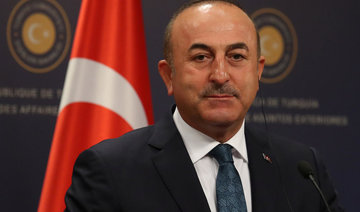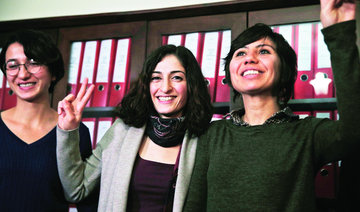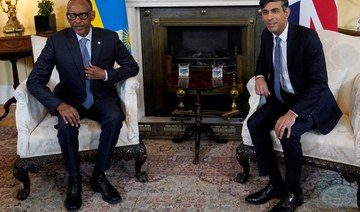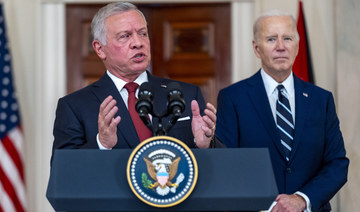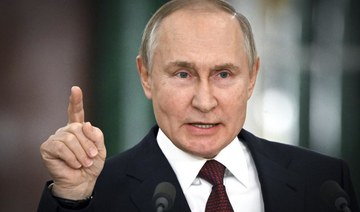ANKARA: In line with its new-year resolution to “reduce its enemies and increase its friends,” as expressed by President Recep Tayyip Erdogan recently, Turkey is extending an olive branch to Germany after months of troubled relations.
Turkish Foreign Minister Mevlut Cavusoglu and his German counterpart Sigmar Gabriel met for talks in the latter’s hometown Goslar on Saturday. They had previously met in November in Cavusoglu’s hometown Antalya.
During a press conference with Gabriel after Saturday’s meeting, Cavusoglu announced that they agreed to resolve disagreements through dialogue and cooperation.
“We have found an opportunity here, in a genuine atmosphere as in Antalya, to evaluate what we can do to improve our relations,” Cavusoglu said.
“As Gabriel said, we do not have to be of the same mind on every issue, but it is better that we put our differences of opinion in parenthesis and move on.”
Cavusoglu also hinted at the possibility of dialogue with Germany on updating the customs union deal between Turkey and the EU, although last year German Chancellor Angela Merkel said her country would veto such an update.
Gabriel praised Turkey’s contribution to the EU in managing refugee flows, saying: “We don’t agree on everything, but we are committed to resolve the common challenges.”
Turkish-German relations hit rock-bottom in 2017, especially after the arrest of several German nationals over terror charges, and a ban on Turkish politicians from campaigning ahead of Turkey’s constitutional referendum in April and September’s national elections in Germany, where about 3 million Turks live.
But Ankara expects relations to warm in 2018. In a recent interview with German news agency DPA, Cavusoglu said the time had come for both countries to start mending ties.
He referred to the case of Deniz Yucel, a Turkish-German journalist held in pre-trial detention in Turkey last year in February on accusations of terror propaganda, without any indictment yet. Cavusoglu said the government has urged the judiciary to accelerate the process.
Days after, in an Op-Ed written for German publishing group Funke Mediengruppe, Cavusoglu called for a “fresh start” with Germany.
He said both countries should come together “as equal partners” and develop more empathy toward each other, rather than conducting “megaphone diplomacy.”
Turkey’s gradual release of German nationals, most recently pilgrim David Britsch and journalist Mesale Tolu, also improved relations, though there are still about a dozen Germans waiting to go free.
Ankara expects from Berlin the extradition of several people connected to the failed coup attempt in 2015 and the outlawed Kurdistan Workers’ Party (PKK) who have sought asylum in Germany.
The German government last March instructed federal authorities to ban PKK flags and the public display of images of its leader Abdullah Ocalan, who is in jail in Turkey. But Berlin is taking caution in terms of normalizing relations with Ankara.
“If we do not speak to one another, the situation can certainly not improve,” Gabriel told the weekly magazine Der Spiegel on Friday.
He said Germany will not authorize a large number of arms exports to Turkey until Yucel’s case has been resolved.
Germany has been Turkey’s biggest trade partner for over a century, with bilateral trade amounting to €174 billion ($209.91 billion) over the last five years. The two countries are also important NATO allies.
“Cavusoglu’s visit to Gabriel’s hometown is another step in their attempts to improve relations, first on the personal level and then on the political one,” Magdalena Kirchner, a fellow at the Istanbul Policy Center, told Arab News.
“These days it seems, the release of Yucel remains the main obstacle for any form of normalization, and as there are reports that this might happen in the coming weeks, things could improve swiftly.”
Kirchner said if domestic politics stay as they are in Turkey, bilateral relations might return to a pragmatic working level, but significant progress on EU accession — the main project of German-Turkish relations since 1999 — would be hard to imagine.
“As we’ve seen in the last year, the disadvantages of bad relations are high, not only economically but also with regard to Germany’s large Turkish community, which had been polarized and in parts even estranged from German politics,” she said.
“Turkey needs Germany as a partner in Brussels if it ever wants to have its EU accession aim realized, but also for any alternative scenario of EU-Turkey relations,” Kirchner added, underlying various common interests in the Middle East, especially controlling migration flows in Syria and Iraq, which require normalizing bilateral ties.
“Improved German-Turkish relations are a requirement, and a first step for better cooperation between Turkey and other EU countries,” she said.
Ozgur Unluhisarcikli, Ankara director of the German Marshall Fund of the United States, said although Saturday’s meeting hints at the possibility of normalizing German-Turkish ties, it is not necessarily a return to the relationship in 2016, when Merkel visited Turkey several times.
“The visit by Erdogan to Paris on Friday, and then this meeting between Cavusoglu and Gabriel, will significantly weaken the argument for suspending (EU) accession negotiations with Turkey,” he told Arab News.
But Unluhisarcikli said further steps, such as updating the customs union or visa liberalization, look almost impossible until Turkey reverses the recent democratic backslide.
“Putting an end to emergency rule, and reforming the counterterrorism law so it’s applicable only to terrorists, are two issues the EU will watch closely,” he added.
Turkey, Germany agree to resolve disagreements through dialogue
Turkey, Germany agree to resolve disagreements through dialogue
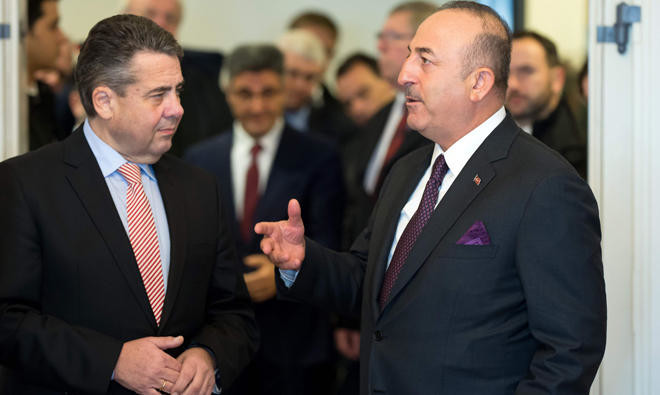
Philippines rules out use of water cannon in disputed South China Sea

- Philippines and China have clashed several times in disputed, resource-rich waterway
- Latest skirmish took place late last month, in an incident Manila describes as dangerous
MANILA: President Ferdinand Marcos Jr. said on Monday that Manila will not use offensive equipment in the disputed South China Sea, after China’s coast guard used high-pressure water cannon on Philippine vessels last week.
The Philippines and China have had several confrontations in the resource-rich area, where Beijing has used water cannon against Filipino vessels in incidents Manila has described as harassment and dangerous.
The latest in a string of maritime clashes occurred on April 30 as tensions continued to rise in the vital waterway that Beijing claims almost in its entirety despite a 2016 international arbitration ruling that rejected its assertion.
“What we are doing is defending our sovereign rights and our sovereignty in the West Philippine Sea. And we have no intention of attacking anyone with water cannons or any other such offensive (weapons),” Marcos said Monday.
“We will not follow the Chinese coast guard and the Chinese vessels down that road because it is not the mission of the navy (or) our coast guard to start or to increase tensions … Their mission is precisely the opposite, it’s to lower tensions.”
Philippine vessels have been regularly targeted by Chinese ships in areas of the South China Sea that are internationally recognized as belonging to the Philippines, which Manila calls the West Philippine Sea.
The Philippines’ Ministry of Foreign Affairs last Thursday summoned Zhou Zhiyong, China’s deputy chief of mission, after the incident left a Philippine coast guard vessel and another government boat damaged.
It was the 20th protest Manila has made against Beijing’s conduct in the South China Sea this year alone, while more than 150 diplomatic complaints have been made over the past two years.
Marcos said the Philippines will continue to respond to South China Sea incidents through diplomatic means.
Marcos’s statement comes days after the defense ministers of the Philippines, the US, Japan and Australia met in Hawaii and issued a joint statement on their strong objections to the “dangerous and destabilizing conduct” of China in the South China Sea.
UK considered Rwanda-style asylum deal with Iraq
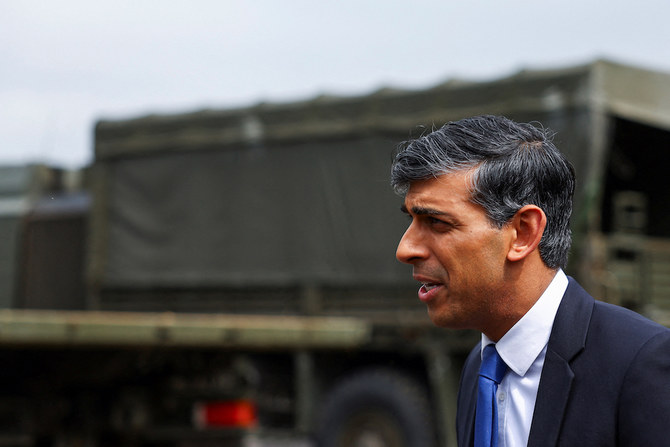
- Documents seen by Sky News reveal London has struck returns agreement with Baghdad
- They also suggest a desire to improve relations with Iran to return people to the country
LONDON: The UK considered sending asylum-seekers to Iraq for processing, new documents have shown.
Iraq is considered very dangerous, with the UK government advising against all travel to the country.
But a plan similar to the Rwanda scheme to process migrants in a third-party country was floated at one stage by Whitehall officials, with negotiations said to have achieved “good recent progress.”
The UK has struck a returns agreement with Baghdad for Iraqi citizens, which was achieved without a formal announcement or acknowledgement and a plea for “discretion,” the documents, seen by Sky News, suggest.
The cache of papers casts new light on the UK government’s approach to dealing with asylum-seekers and illegal migration, including a desire to improve relations with the Iranian Embassy in London in order to ease the repatriation of Iranian citizens, and moves to establish return agreements with Eritrea and Ethiopia.
Biden meets Jordan’s King Abdullah as Gaza ceasefire hopes dim
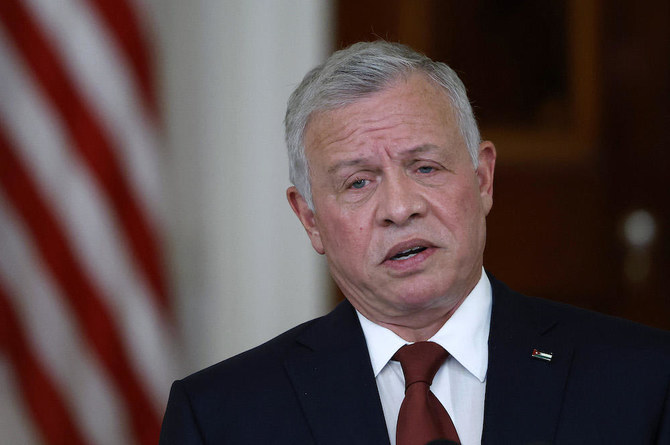
- Monday’s meeting between two leaders is not a formal bilateral meeting but an informal private meeting
- US president Biden faces increasing pressure politically to convince Israel to hold off on an invasion
WASHINGTON: President Joe Biden will meet Middle East ally, Jordan’s King Abdullah II, at the White House on Monday with prospects for a Gaza ceasefire appearing slim and Palestinian Islamist group Hamas and Israeli officials blaming each other for the impasse.
On Sunday, Hamas reiterated its demand for an end to the war in exchange for the freeing of hostages, and Israeli Prime Minister Benjamin Netanyahu flatly ruled that out. Hamas also attacked the Kerem Shalom crossing into Gaza that Israel said killed three of its soldiers.
A Jordanian diplomat said Monday’s meeting between Biden and King Abdullah is not a formal bilateral meeting but an informal private meeting. It comes as the Biden administration and Israeli officials remain at odds over Israel’s planned military incursion in Rafah.
Biden last met King Abdullah at the White House in February and the two longtime allies discussed a daunting list of challenges, including a looming Israeli ground offensive in southern Gaza and the threat of a humanitarian calamity among Palestinian civilians. Jordan and other Arab states have been highly critical of Israel’s actions and have been demanding a ceasefire since mid-October as civilian casualties began to skyrocket. The war began after Hamas stunned Israel with a cross-border raid on Oct. 7 in which 1,200 people were killed and 252 hostages taken, according to Israeli tallies.
Biden last spoke to Netanyahu on April 28 and “reiterated his clear position” on a possible invasion of the Gaza border city of Rafah, the White House said. The US president has been vocal in his demand that Israel not undertake a ground offensive in Rafah without a plan to protect Palestinian civilians.
With pro-Palestinian protests erupting across US college campuses, Biden faces increasing pressure politically to convince Israel to hold off on an invasion. Biden addressed the campus unrest over the war in Gaza last week but said the campus protests had not forced him to reconsider his policies in the Middle East.
Russia’s president Putin orders nuclear drills with troops near Ukraine
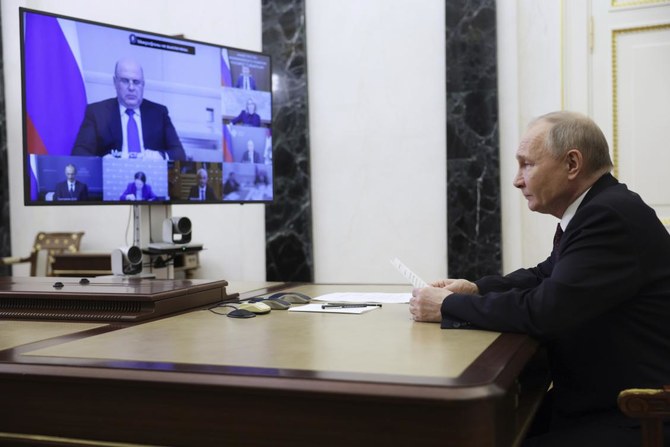
- Putin has upped his nuclear rhetoric since the Ukraine conflict began, warning in his address to the nation in February there was a ‘real’ risk of nuclear war
MOSCOW: President Vladimir Putin has ordered the Russian military to hold nuclear weapons drills involving the navy and troops based near Ukraine, the defense ministry said Monday.
Putin has upped his nuclear rhetoric since the Ukraine conflict began, warning in his address to the nation in February there was a “real” risk of nuclear war.
“During the exercise, a set of measures will be taken to practice the preparation and use of non-strategic nuclear weapons,” the defense ministry said.
Non-strategic nuclear weapons, also known as tactical nuclear weapons, are designed for use on the battlefield and can be delivered via missiles.
The ministry said the exercises would take place “in the near future” and were aimed at ensuring Russia’s territorial integrity in the face of “threats by certain Western officials.”
Aircraft and naval forces will take part, as well as troops from the Southern Military District, which borders Ukraine and includes the occupied Ukrainian territories, it said.
Western officials have become increasingly alarmed by the Kremlin’s nuclear rhetoric during the offensive in Ukraine, with Putin frequently invoking Russia’s nuclear doctrine.
Last year Russia ditched its ratification of the Comprehensive Nuclear Test Ban Treaty and pulled out of a key arms reduction agreement with the United States.
No place to pray for Muslim workers in Italian city

- Urban planning regulations tightly limit the establishment of places of worship, mayor says
- Islam is not among the 13 religions that have official status under Italian law
MONFALCONE, Italy: It’s Friday prayers in the northeastern Italian city of Monfalcone, and hundreds of men are on their knees in a concrete parking lot, their heads bowed to the ground.
They are just a fraction of the city’s Muslims who since November have been banned from praying inside their two cultural centers by Monfalcone’s far-right mayor.
Instead, they assemble in this privately owned construction site as they await a court decision later this month to settle a zoning issue they say has barred their constitutional right to prayer.
Among them is Rejaul Haq, the property’s owner, who expresses frustration over what he and many other Muslims see as harassment by the city they call home.
“Tell me where I should go? Why do I have to go outside of Monfalcone? I live here, I pay taxes here!” lamented Haq, a naturalized Italian citizen who arrived from Bangladesh in 2006.
“Catholics, Orthodox, Protestants, Jehovah’s, if they all have their church — why can’t we have one?”
Immigrants make up a third of this city of 30,000 inhabitants outside Trieste, most of them Bangladeshi Muslims who began arriving in the late 1990s to build cruise-liners for ship builder Fincantieri, whose Monfalcone shipyard is Italy’s largest.
Their presence is immediately visible, whether the Bangladeshi men on bicycles peddling to and from work or the ethnic grocery stores on street corners.
For Mayor Anna Cisint, the restriction on prayer is about zoning, not discrimination.
Urban planning regulations tightly limit the establishment of places of worship, and as a mayor in a secular state, she says it is not her job to provide them.
“As a mayor, I’m not against anybody, I wouldn’t even waste my time being against anybody, you see, but I’m also here to enforce the law,” Cisint said.
Still, she argues the number of Muslim immigrants, boosted by family reunifications and new births, has become “too many for Monfalcone.”
“There are too many... you have to tell it like it is,” she said.
Her warnings about the “social unsustainability” of Monfalcone’s Muslim population have propelled Cisint to national headlines in recent months.
They have also assured her a spot in upcoming European Parliament elections for Matteo Salvini’s anti-immigrant League party, part of Prime Minister Giorgia Meloni’s coalition government.
The League for decades has obstructed mosque openings in its stronghold of northern Italy. But the problem is nationwide in Catholic-majority Italy.
Islam is not among the 13 religions that have official status under Italian law, which complicates efforts to build places of worship.
There are currently fewer than 10 officially recognized mosques, said Yahya Zanolo of the Italian Islamic Religious Community (COREIS), one of the country’s main Muslim associations.
That means that out of Italy’s estimated more than two million Muslims, most are relegated to thousands of makeshift places of worship that “feed prejudice and fear in the non-Muslim population,” said Zanolo.
Cisint, who has been under police protection since receiving online death threats in December, complains about a resistance to integration by what she called a “very closed” community.
She asks why Arabic and not Italian is taught in the community centers and calls “intolerable” wives walking behind husbands or schoolgirls in veils.
In the run-up to European elections, the League has once again seized on illegal immigration to Italy — where nearly 160,000 migrants arrived by boat last year, mostly from Muslim countries — as a vote-winner.
Salvini has called the June vote “a referendum on the future of Europe,” to decide “whether Europe will still exist or whether it will be a Sino-Islamic colony.”
But Monfalcone’s Muslims don’t fit the stereotypes exploited by the League, armed as they are with work permits or passports.
“It’s not like we came here to see the beautiful city of Monfalcone,” jokes Haq. “It’s because there’s work here.”
Many Muslims said they feel a palpable sense of distrust, if not outright hatred, from some of the long-time residents.
Ahmed Raju, 38, who works at Fincantieri installing panels, has mostly prayed at home since the cultural centers have been off-limits.
Such is the reach of the mayor’s rhetoric that “even I get scared” about Muslims, Raju said.
Of the prejudice the community faces, Raju added: “You feel like you’re in front of a big wall, that you can’t break down.”
“We’re foreigners. We can’t change the situation.”
Outside a classroom where volunteers teach Italian to recently immigrated women, Sharmin Islam, 32, said the animosity is acutely felt by her young son who was born in Italy.
“He comes back from school and asks, ‘Mum, are we Muslims bad?’”
An administrative court in Trieste will rule on May 23 whether to uphold or strike down the mayor’s ban on prayer within the cultural centers.
Haq says Monfalcone’s Muslims have “no Plan B” if they lose, but worries even if they win the scars from the stand-off will remain.
Meanwhile Cisint has been actively promoting her book, “Enough Already: Immigration, Islamization, Submission,” warning Monfalcone’s situation could be duplicated elsewhere.
On a recent public holiday, Bangladeshis filled the city’s main square, from little girls with unicorn balloons to groups of young men enjoying a day off.
Looking on was barman Gennaro Pomatico, 24.
“The locals won’t ever accept them,” said Pomatico.
“But ultimately they don’t bother anyone.”



